International Travel & Tourism: Crisis Management Post COVID-19
VerifiedAdded on 2023/06/17
|15
|3654
|163
Project
AI Summary
This project proposal investigates the impact of COVID-19 on the travel and tourism sector and the crisis management practices employed in response. The research aims to determine the industry's reaction to the pandemic and the effectiveness of its crisis management strategies. Objectives include analysing crisis management practices, identifying challenges faced due to COVID-19, examining the industry's response to the issues, and inspecting the role of crisis management. The research employs a positivism philosophy and deductive approach, utilizing surveys and quantitative data collection methods to assess the impact and responses within the industry. The proposal outlines activities, timescales, and methodologies for gathering and analysing data to provide insights into the crisis management strategies adopted by the travel and tourism sector during the COVID-19 pandemic.
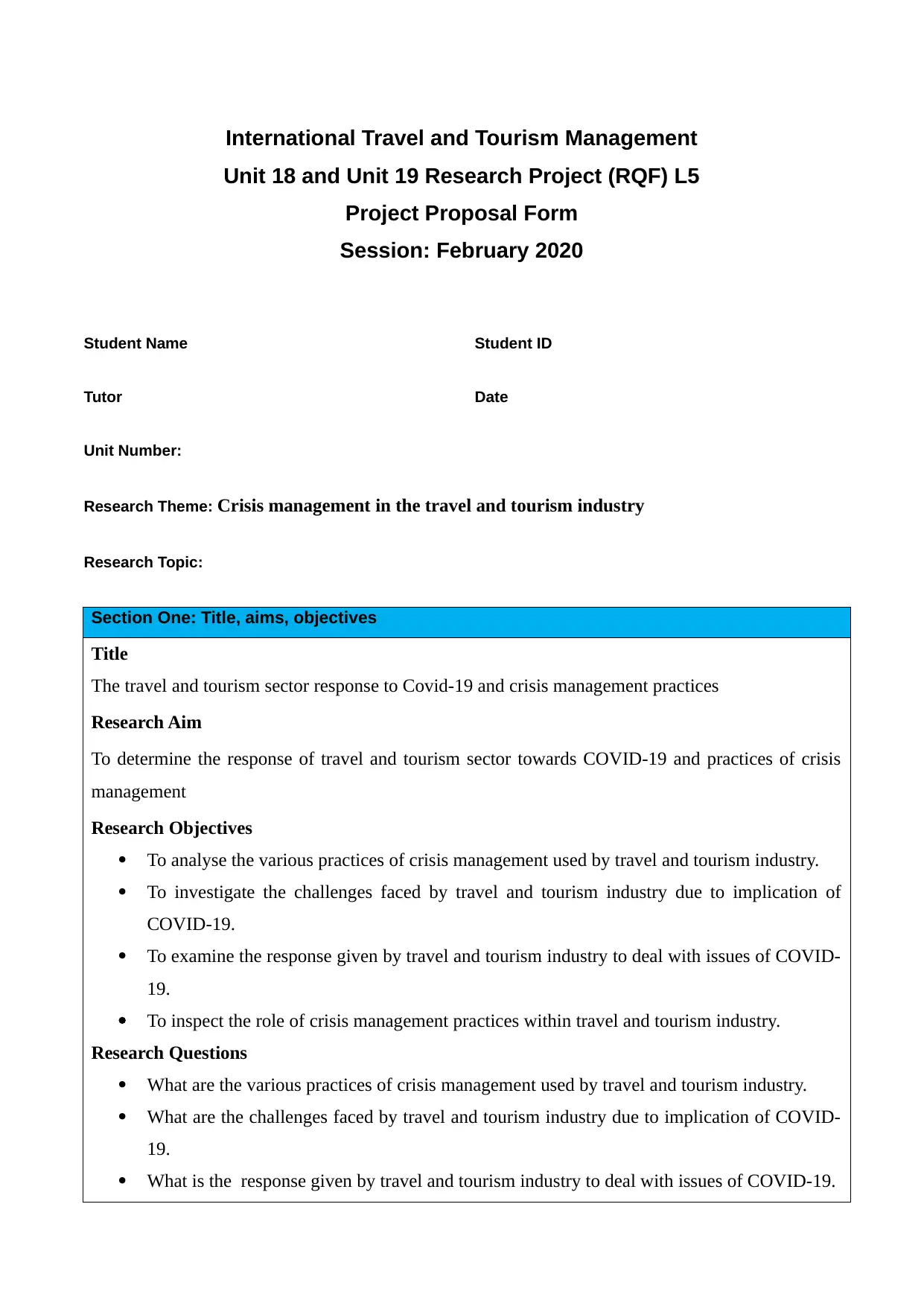
International Travel and Tourism Management
Unit 18 and Unit 19 Research Project (RQF) L5
Project Proposal Form
Session: February 2020
Student Name Student ID
Tutor Date
Unit Number:
Research Theme: Crisis management in the travel and tourism industry
Research Topic:
Section One: Title, aims, objectives
Title
The travel and tourism sector response to Covid-19 and crisis management practices
Research Aim
To determine the response of travel and tourism sector towards COVID-19 and practices of crisis
management
Research Objectives
To analyse the various practices of crisis management used by travel and tourism industry.
To investigate the challenges faced by travel and tourism industry due to implication of
COVID-19.
To examine the response given by travel and tourism industry to deal with issues of COVID-
19.
To inspect the role of crisis management practices within travel and tourism industry.
Research Questions
What are the various practices of crisis management used by travel and tourism industry.
What are the challenges faced by travel and tourism industry due to implication of COVID-
19.
What is the response given by travel and tourism industry to deal with issues of COVID-19.
Unit 18 and Unit 19 Research Project (RQF) L5
Project Proposal Form
Session: February 2020
Student Name Student ID
Tutor Date
Unit Number:
Research Theme: Crisis management in the travel and tourism industry
Research Topic:
Section One: Title, aims, objectives
Title
The travel and tourism sector response to Covid-19 and crisis management practices
Research Aim
To determine the response of travel and tourism sector towards COVID-19 and practices of crisis
management
Research Objectives
To analyse the various practices of crisis management used by travel and tourism industry.
To investigate the challenges faced by travel and tourism industry due to implication of
COVID-19.
To examine the response given by travel and tourism industry to deal with issues of COVID-
19.
To inspect the role of crisis management practices within travel and tourism industry.
Research Questions
What are the various practices of crisis management used by travel and tourism industry.
What are the challenges faced by travel and tourism industry due to implication of COVID-
19.
What is the response given by travel and tourism industry to deal with issues of COVID-19.
Paraphrase This Document
Need a fresh take? Get an instant paraphrase of this document with our AI Paraphraser
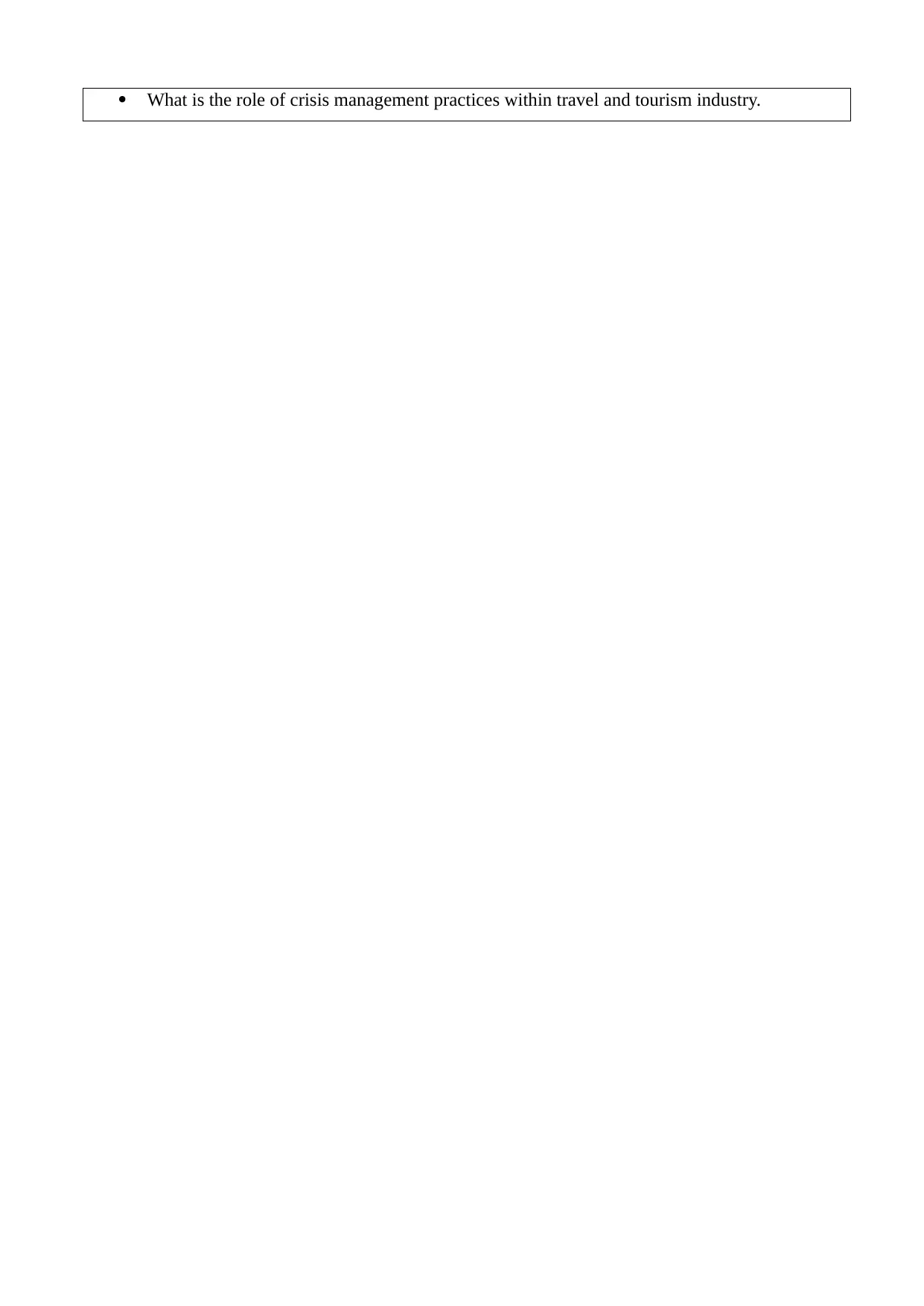
What is the role of crisis management practices within travel and tourism industry.
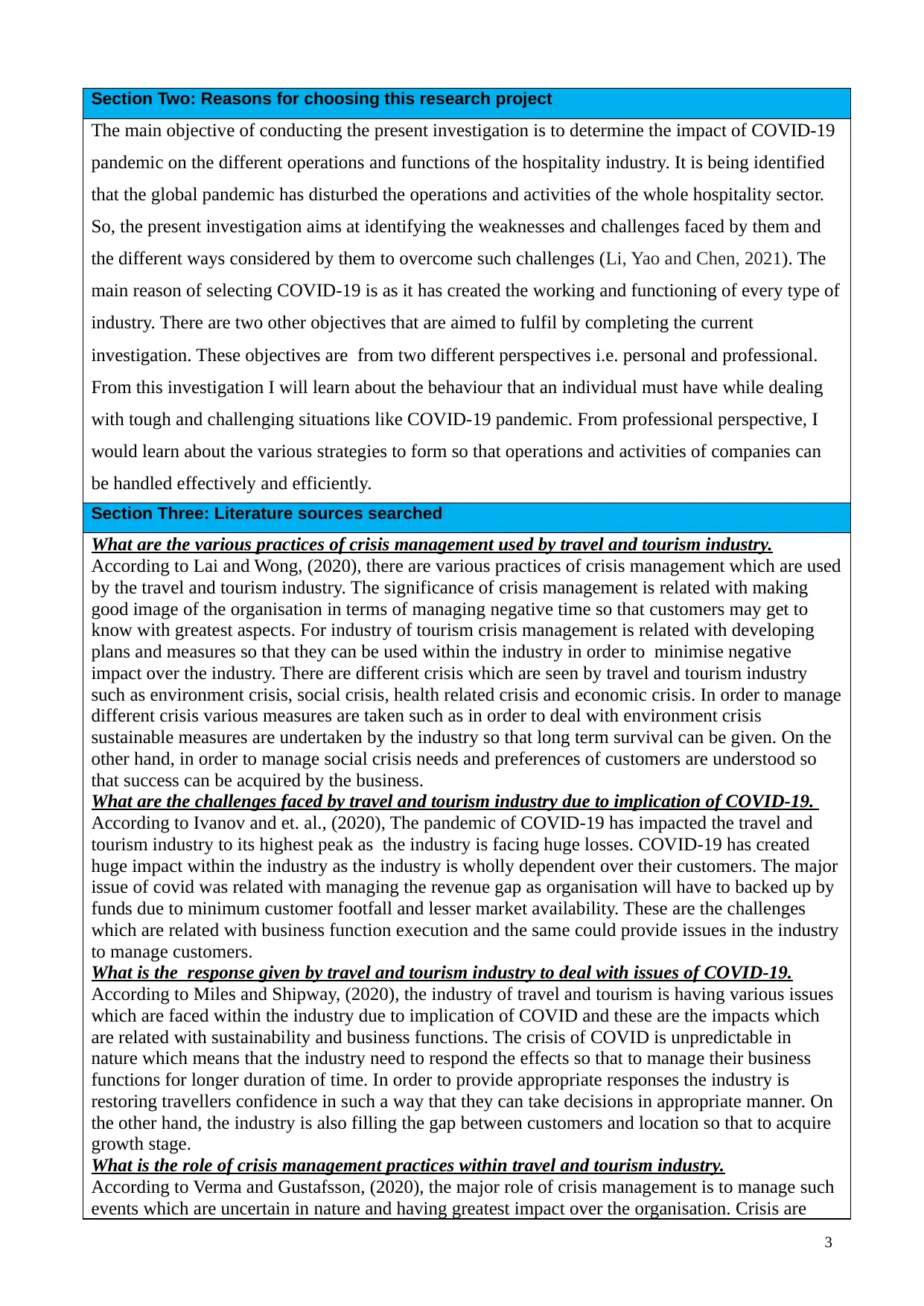
Section Two: Reasons for choosing this research project
The main objective of conducting the present investigation is to determine the impact of COVID-19
pandemic on the different operations and functions of the hospitality industry. It is being identified
that the global pandemic has disturbed the operations and activities of the whole hospitality sector.
So, the present investigation aims at identifying the weaknesses and challenges faced by them and
the different ways considered by them to overcome such challenges (Li, Yao and Chen, 2021). The
main reason of selecting COVID-19 is as it has created the working and functioning of every type of
industry. There are two other objectives that are aimed to fulfil by completing the current
investigation. These objectives are from two different perspectives i.e. personal and professional.
From this investigation I will learn about the behaviour that an individual must have while dealing
with tough and challenging situations like COVID-19 pandemic. From professional perspective, I
would learn about the various strategies to form so that operations and activities of companies can
be handled effectively and efficiently.
Section Three: Literature sources searched
What are the various practices of crisis management used by travel and tourism industry.
According to Lai and Wong, (2020), there are various practices of crisis management which are used
by the travel and tourism industry. The significance of crisis management is related with making
good image of the organisation in terms of managing negative time so that customers may get to
know with greatest aspects. For industry of tourism crisis management is related with developing
plans and measures so that they can be used within the industry in order to minimise negative
impact over the industry. There are different crisis which are seen by travel and tourism industry
such as environment crisis, social crisis, health related crisis and economic crisis. In order to manage
different crisis various measures are taken such as in order to deal with environment crisis
sustainable measures are undertaken by the industry so that long term survival can be given. On the
other hand, in order to manage social crisis needs and preferences of customers are understood so
that success can be acquired by the business.
What are the challenges faced by travel and tourism industry due to implication of COVID-19.
According to Ivanov and et. al., (2020), The pandemic of COVID-19 has impacted the travel and
tourism industry to its highest peak as the industry is facing huge losses. COVID-19 has created
huge impact within the industry as the industry is wholly dependent over their customers. The major
issue of covid was related with managing the revenue gap as organisation will have to backed up by
funds due to minimum customer footfall and lesser market availability. These are the challenges
which are related with business function execution and the same could provide issues in the industry
to manage customers.
What is the response given by travel and tourism industry to deal with issues of COVID-19.
According to Miles and Shipway, (2020), the industry of travel and tourism is having various issues
which are faced within the industry due to implication of COVID and these are the impacts which
are related with sustainability and business functions. The crisis of COVID is unpredictable in
nature which means that the industry need to respond the effects so that to manage their business
functions for longer duration of time. In order to provide appropriate responses the industry is
restoring travellers confidence in such a way that they can take decisions in appropriate manner. On
the other hand, the industry is also filling the gap between customers and location so that to acquire
growth stage.
What is the role of crisis management practices within travel and tourism industry.
According to Verma and Gustafsson, (2020), the major role of crisis management is to manage such
events which are uncertain in nature and having greatest impact over the organisation. Crisis are
3
The main objective of conducting the present investigation is to determine the impact of COVID-19
pandemic on the different operations and functions of the hospitality industry. It is being identified
that the global pandemic has disturbed the operations and activities of the whole hospitality sector.
So, the present investigation aims at identifying the weaknesses and challenges faced by them and
the different ways considered by them to overcome such challenges (Li, Yao and Chen, 2021). The
main reason of selecting COVID-19 is as it has created the working and functioning of every type of
industry. There are two other objectives that are aimed to fulfil by completing the current
investigation. These objectives are from two different perspectives i.e. personal and professional.
From this investigation I will learn about the behaviour that an individual must have while dealing
with tough and challenging situations like COVID-19 pandemic. From professional perspective, I
would learn about the various strategies to form so that operations and activities of companies can
be handled effectively and efficiently.
Section Three: Literature sources searched
What are the various practices of crisis management used by travel and tourism industry.
According to Lai and Wong, (2020), there are various practices of crisis management which are used
by the travel and tourism industry. The significance of crisis management is related with making
good image of the organisation in terms of managing negative time so that customers may get to
know with greatest aspects. For industry of tourism crisis management is related with developing
plans and measures so that they can be used within the industry in order to minimise negative
impact over the industry. There are different crisis which are seen by travel and tourism industry
such as environment crisis, social crisis, health related crisis and economic crisis. In order to manage
different crisis various measures are taken such as in order to deal with environment crisis
sustainable measures are undertaken by the industry so that long term survival can be given. On the
other hand, in order to manage social crisis needs and preferences of customers are understood so
that success can be acquired by the business.
What are the challenges faced by travel and tourism industry due to implication of COVID-19.
According to Ivanov and et. al., (2020), The pandemic of COVID-19 has impacted the travel and
tourism industry to its highest peak as the industry is facing huge losses. COVID-19 has created
huge impact within the industry as the industry is wholly dependent over their customers. The major
issue of covid was related with managing the revenue gap as organisation will have to backed up by
funds due to minimum customer footfall and lesser market availability. These are the challenges
which are related with business function execution and the same could provide issues in the industry
to manage customers.
What is the response given by travel and tourism industry to deal with issues of COVID-19.
According to Miles and Shipway, (2020), the industry of travel and tourism is having various issues
which are faced within the industry due to implication of COVID and these are the impacts which
are related with sustainability and business functions. The crisis of COVID is unpredictable in
nature which means that the industry need to respond the effects so that to manage their business
functions for longer duration of time. In order to provide appropriate responses the industry is
restoring travellers confidence in such a way that they can take decisions in appropriate manner. On
the other hand, the industry is also filling the gap between customers and location so that to acquire
growth stage.
What is the role of crisis management practices within travel and tourism industry.
According to Verma and Gustafsson, (2020), the major role of crisis management is to manage such
events which are uncertain in nature and having greatest impact over the organisation. Crisis are
3
⊘ This is a preview!⊘
Do you want full access?
Subscribe today to unlock all pages.

Trusted by 1+ million students worldwide
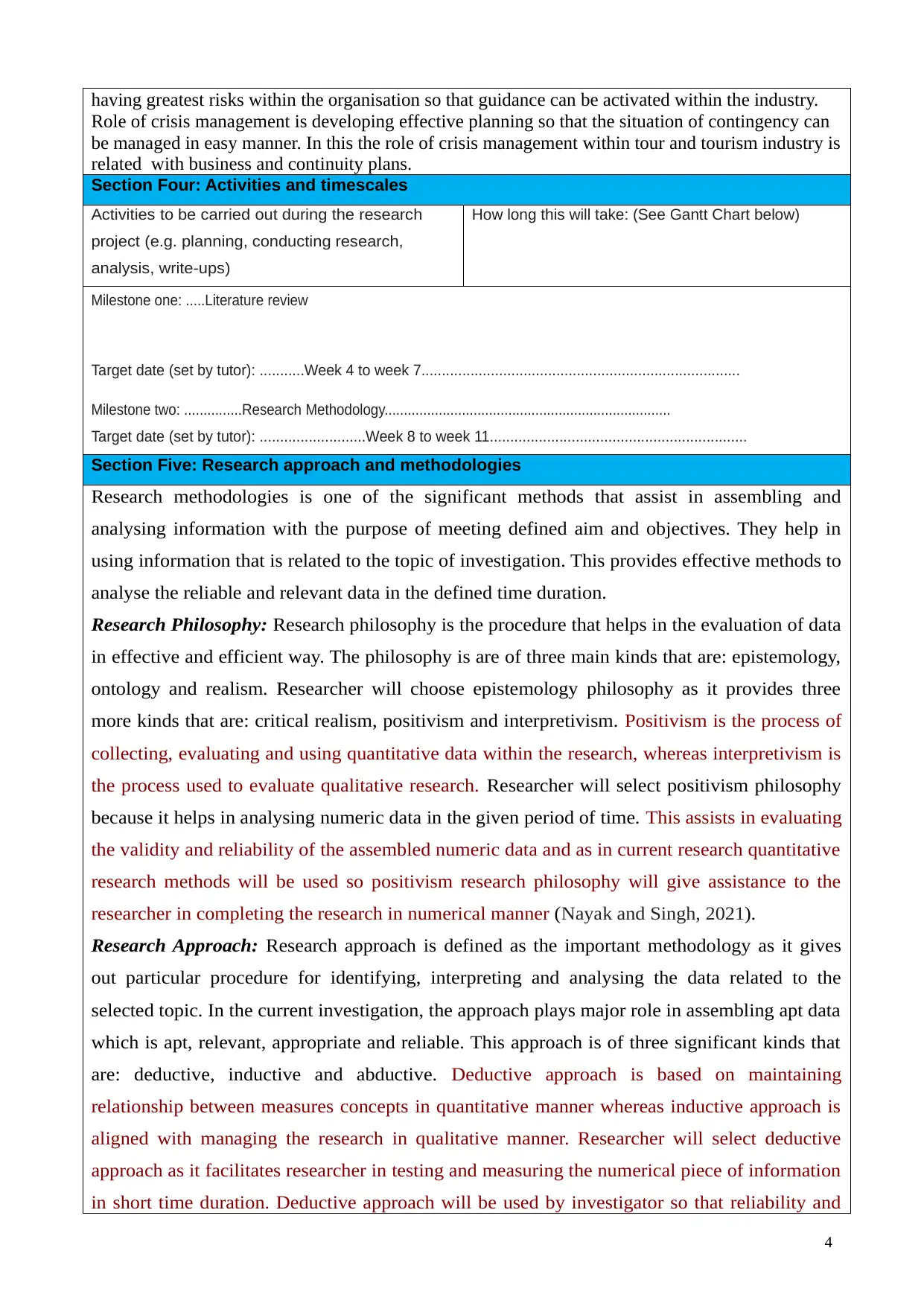
having greatest risks within the organisation so that guidance can be activated within the industry.
Role of crisis management is developing effective planning so that the situation of contingency can
be managed in easy manner. In this the role of crisis management within tour and tourism industry is
related with business and continuity plans.
Section Four: Activities and timescales
Activities to be carried out during the research
project (e.g. planning, conducting research,
analysis, write-ups)
How long this will take: (See Gantt Chart below)
Milestone one: .....Literature review
Target date (set by tutor): ...........Week 4 to week 7..............................................................................
Milestone two: ...............Research Methodology..........................................................................
Target date (set by tutor): ..........................Week 8 to week 11...............................................................
Section Five: Research approach and methodologies
Research methodologies is one of the significant methods that assist in assembling and
analysing information with the purpose of meeting defined aim and objectives. They help in
using information that is related to the topic of investigation. This provides effective methods to
analyse the reliable and relevant data in the defined time duration.
Research Philosophy: Research philosophy is the procedure that helps in the evaluation of data
in effective and efficient way. The philosophy is are of three main kinds that are: epistemology,
ontology and realism. Researcher will choose epistemology philosophy as it provides three
more kinds that are: critical realism, positivism and interpretivism. Positivism is the process of
collecting, evaluating and using quantitative data within the research, whereas interpretivism is
the process used to evaluate qualitative research. Researcher will select positivism philosophy
because it helps in analysing numeric data in the given period of time. This assists in evaluating
the validity and reliability of the assembled numeric data and as in current research quantitative
research methods will be used so positivism research philosophy will give assistance to the
researcher in completing the research in numerical manner (Nayak and Singh, 2021).
Research Approach: Research approach is defined as the important methodology as it gives
out particular procedure for identifying, interpreting and analysing the data related to the
selected topic. In the current investigation, the approach plays major role in assembling apt data
which is apt, relevant, appropriate and reliable. This approach is of three significant kinds that
are: deductive, inductive and abductive. Deductive approach is based on maintaining
relationship between measures concepts in quantitative manner whereas inductive approach is
aligned with managing the research in qualitative manner. Researcher will select deductive
approach as it facilitates researcher in testing and measuring the numerical piece of information
in short time duration. Deductive approach will be used by investigator so that reliability and
4
Role of crisis management is developing effective planning so that the situation of contingency can
be managed in easy manner. In this the role of crisis management within tour and tourism industry is
related with business and continuity plans.
Section Four: Activities and timescales
Activities to be carried out during the research
project (e.g. planning, conducting research,
analysis, write-ups)
How long this will take: (See Gantt Chart below)
Milestone one: .....Literature review
Target date (set by tutor): ...........Week 4 to week 7..............................................................................
Milestone two: ...............Research Methodology..........................................................................
Target date (set by tutor): ..........................Week 8 to week 11...............................................................
Section Five: Research approach and methodologies
Research methodologies is one of the significant methods that assist in assembling and
analysing information with the purpose of meeting defined aim and objectives. They help in
using information that is related to the topic of investigation. This provides effective methods to
analyse the reliable and relevant data in the defined time duration.
Research Philosophy: Research philosophy is the procedure that helps in the evaluation of data
in effective and efficient way. The philosophy is are of three main kinds that are: epistemology,
ontology and realism. Researcher will choose epistemology philosophy as it provides three
more kinds that are: critical realism, positivism and interpretivism. Positivism is the process of
collecting, evaluating and using quantitative data within the research, whereas interpretivism is
the process used to evaluate qualitative research. Researcher will select positivism philosophy
because it helps in analysing numeric data in the given period of time. This assists in evaluating
the validity and reliability of the assembled numeric data and as in current research quantitative
research methods will be used so positivism research philosophy will give assistance to the
researcher in completing the research in numerical manner (Nayak and Singh, 2021).
Research Approach: Research approach is defined as the important methodology as it gives
out particular procedure for identifying, interpreting and analysing the data related to the
selected topic. In the current investigation, the approach plays major role in assembling apt data
which is apt, relevant, appropriate and reliable. This approach is of three significant kinds that
are: deductive, inductive and abductive. Deductive approach is based on maintaining
relationship between measures concepts in quantitative manner whereas inductive approach is
aligned with managing the research in qualitative manner. Researcher will select deductive
approach as it facilitates researcher in testing and measuring the numerical piece of information
in short time duration. Deductive approach will be used by investigator so that reliability and
4
Paraphrase This Document
Need a fresh take? Get an instant paraphrase of this document with our AI Paraphraser
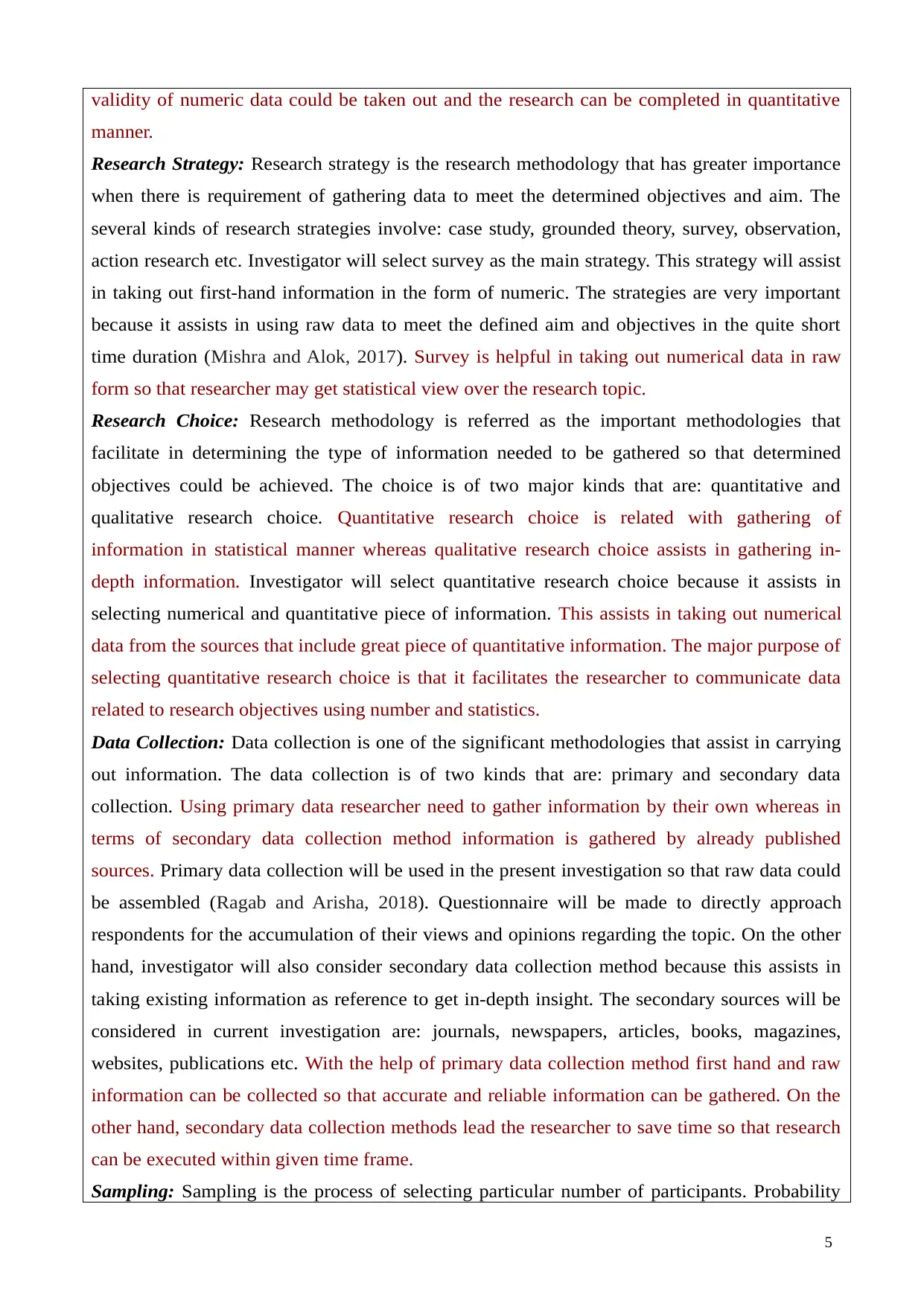
validity of numeric data could be taken out and the research can be completed in quantitative
manner.
Research Strategy: Research strategy is the research methodology that has greater importance
when there is requirement of gathering data to meet the determined objectives and aim. The
several kinds of research strategies involve: case study, grounded theory, survey, observation,
action research etc. Investigator will select survey as the main strategy. This strategy will assist
in taking out first-hand information in the form of numeric. The strategies are very important
because it assists in using raw data to meet the defined aim and objectives in the quite short
time duration (Mishra and Alok, 2017). Survey is helpful in taking out numerical data in raw
form so that researcher may get statistical view over the research topic.
Research Choice: Research methodology is referred as the important methodologies that
facilitate in determining the type of information needed to be gathered so that determined
objectives could be achieved. The choice is of two major kinds that are: quantitative and
qualitative research choice. Quantitative research choice is related with gathering of
information in statistical manner whereas qualitative research choice assists in gathering in-
depth information. Investigator will select quantitative research choice because it assists in
selecting numerical and quantitative piece of information. This assists in taking out numerical
data from the sources that include great piece of quantitative information. The major purpose of
selecting quantitative research choice is that it facilitates the researcher to communicate data
related to research objectives using number and statistics.
Data Collection: Data collection is one of the significant methodologies that assist in carrying
out information. The data collection is of two kinds that are: primary and secondary data
collection. Using primary data researcher need to gather information by their own whereas in
terms of secondary data collection method information is gathered by already published
sources. Primary data collection will be used in the present investigation so that raw data could
be assembled (Ragab and Arisha, 2018). Questionnaire will be made to directly approach
respondents for the accumulation of their views and opinions regarding the topic. On the other
hand, investigator will also consider secondary data collection method because this assists in
taking existing information as reference to get in-depth insight. The secondary sources will be
considered in current investigation are: journals, newspapers, articles, books, magazines,
websites, publications etc. With the help of primary data collection method first hand and raw
information can be collected so that accurate and reliable information can be gathered. On the
other hand, secondary data collection methods lead the researcher to save time so that research
can be executed within given time frame.
Sampling: Sampling is the process of selecting particular number of participants. Probability
5
manner.
Research Strategy: Research strategy is the research methodology that has greater importance
when there is requirement of gathering data to meet the determined objectives and aim. The
several kinds of research strategies involve: case study, grounded theory, survey, observation,
action research etc. Investigator will select survey as the main strategy. This strategy will assist
in taking out first-hand information in the form of numeric. The strategies are very important
because it assists in using raw data to meet the defined aim and objectives in the quite short
time duration (Mishra and Alok, 2017). Survey is helpful in taking out numerical data in raw
form so that researcher may get statistical view over the research topic.
Research Choice: Research methodology is referred as the important methodologies that
facilitate in determining the type of information needed to be gathered so that determined
objectives could be achieved. The choice is of two major kinds that are: quantitative and
qualitative research choice. Quantitative research choice is related with gathering of
information in statistical manner whereas qualitative research choice assists in gathering in-
depth information. Investigator will select quantitative research choice because it assists in
selecting numerical and quantitative piece of information. This assists in taking out numerical
data from the sources that include great piece of quantitative information. The major purpose of
selecting quantitative research choice is that it facilitates the researcher to communicate data
related to research objectives using number and statistics.
Data Collection: Data collection is one of the significant methodologies that assist in carrying
out information. The data collection is of two kinds that are: primary and secondary data
collection. Using primary data researcher need to gather information by their own whereas in
terms of secondary data collection method information is gathered by already published
sources. Primary data collection will be used in the present investigation so that raw data could
be assembled (Ragab and Arisha, 2018). Questionnaire will be made to directly approach
respondents for the accumulation of their views and opinions regarding the topic. On the other
hand, investigator will also consider secondary data collection method because this assists in
taking existing information as reference to get in-depth insight. The secondary sources will be
considered in current investigation are: journals, newspapers, articles, books, magazines,
websites, publications etc. With the help of primary data collection method first hand and raw
information can be collected so that accurate and reliable information can be gathered. On the
other hand, secondary data collection methods lead the researcher to save time so that research
can be executed within given time frame.
Sampling: Sampling is the process of selecting particular number of participants. Probability
5
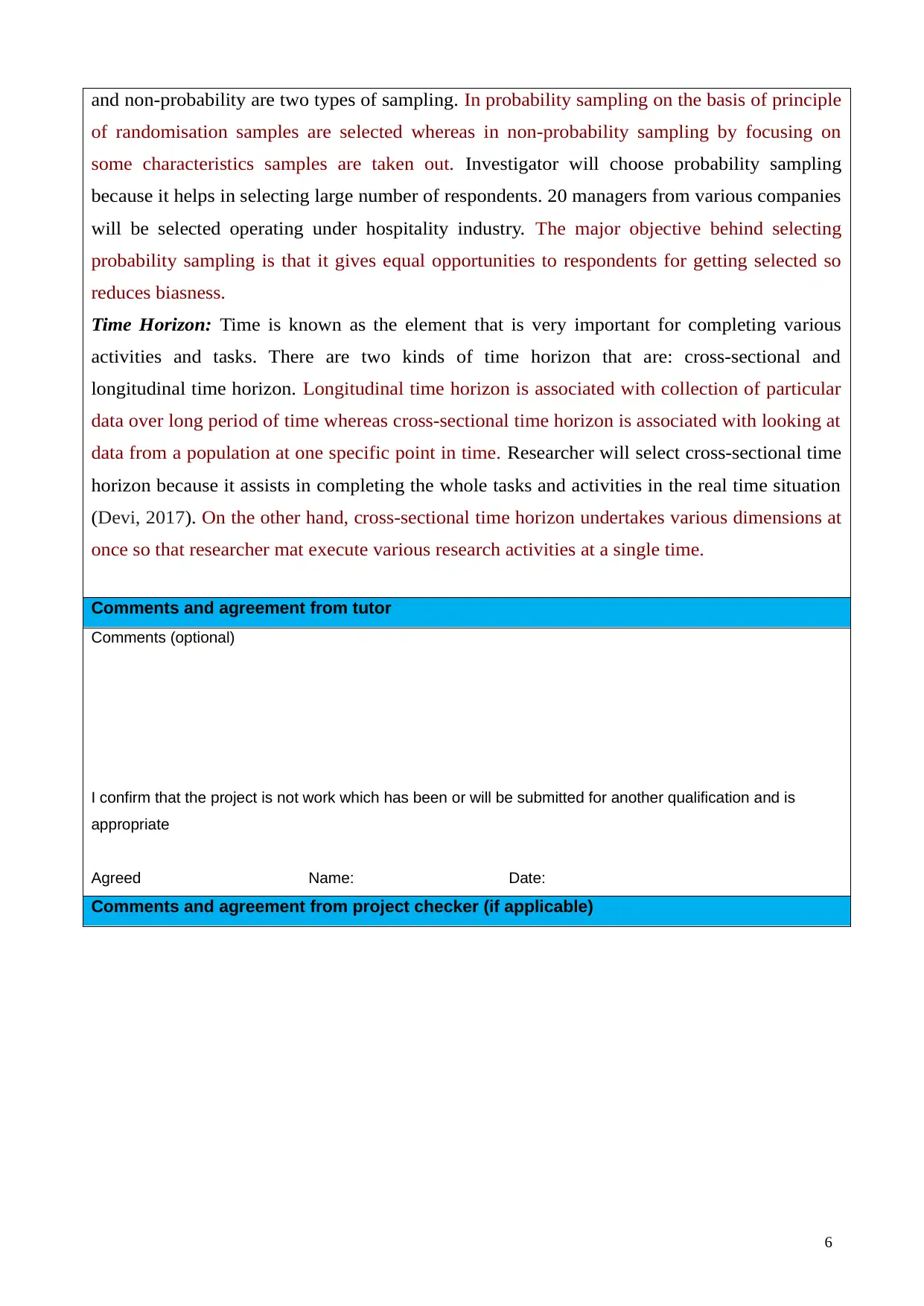
and non-probability are two types of sampling. In probability sampling on the basis of principle
of randomisation samples are selected whereas in non-probability sampling by focusing on
some characteristics samples are taken out. Investigator will choose probability sampling
because it helps in selecting large number of respondents. 20 managers from various companies
will be selected operating under hospitality industry. The major objective behind selecting
probability sampling is that it gives equal opportunities to respondents for getting selected so
reduces biasness.
Time Horizon: Time is known as the element that is very important for completing various
activities and tasks. There are two kinds of time horizon that are: cross-sectional and
longitudinal time horizon. Longitudinal time horizon is associated with collection of particular
data over long period of time whereas cross-sectional time horizon is associated with looking at
data from a population at one specific point in time. Researcher will select cross-sectional time
horizon because it assists in completing the whole tasks and activities in the real time situation
(Devi, 2017). On the other hand, cross-sectional time horizon undertakes various dimensions at
once so that researcher mat execute various research activities at a single time.
Comments and agreement from tutor
Comments (optional)
I confirm that the project is not work which has been or will be submitted for another qualification and is
appropriate
Agreed Name: Date:
Comments and agreement from project checker (if applicable)
6
of randomisation samples are selected whereas in non-probability sampling by focusing on
some characteristics samples are taken out. Investigator will choose probability sampling
because it helps in selecting large number of respondents. 20 managers from various companies
will be selected operating under hospitality industry. The major objective behind selecting
probability sampling is that it gives equal opportunities to respondents for getting selected so
reduces biasness.
Time Horizon: Time is known as the element that is very important for completing various
activities and tasks. There are two kinds of time horizon that are: cross-sectional and
longitudinal time horizon. Longitudinal time horizon is associated with collection of particular
data over long period of time whereas cross-sectional time horizon is associated with looking at
data from a population at one specific point in time. Researcher will select cross-sectional time
horizon because it assists in completing the whole tasks and activities in the real time situation
(Devi, 2017). On the other hand, cross-sectional time horizon undertakes various dimensions at
once so that researcher mat execute various research activities at a single time.
Comments and agreement from tutor
Comments (optional)
I confirm that the project is not work which has been or will be submitted for another qualification and is
appropriate
Agreed Name: Date:
Comments and agreement from project checker (if applicable)
6
⊘ This is a preview!⊘
Do you want full access?
Subscribe today to unlock all pages.

Trusted by 1+ million students worldwide
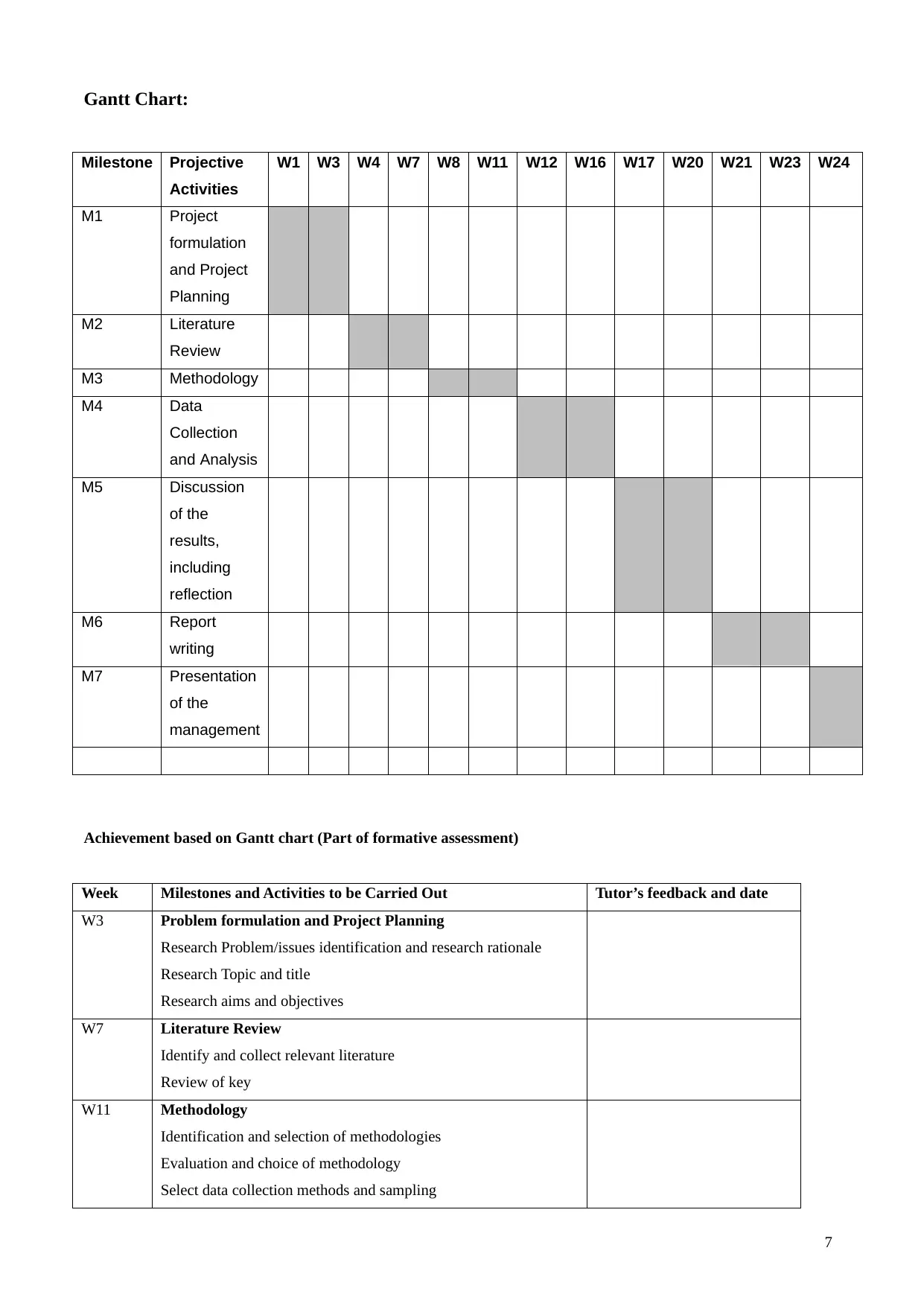
Gantt Chart:
Milestone Projective
Activities
W1 W3 W4 W7 W8 W11 W12 W16 W17 W20 W21 W23 W24
M1 Project
formulation
and Project
Planning
M2 Literature
Review
M3 Methodology
M4 Data
Collection
and Analysis
M5 Discussion
of the
results,
including
reflection
M6 Report
writing
M7 Presentation
of the
management
Achievement based on Gantt chart (Part of formative assessment)
Week Milestones and Activities to be Carried Out Tutor’s feedback and date
W3 Problem formulation and Project Planning
Research Problem/issues identification and research rationale
Research Topic and title
Research aims and objectives
W7 Literature Review
Identify and collect relevant literature
Review of key
W11 Methodology
Identification and selection of methodologies
Evaluation and choice of methodology
Select data collection methods and sampling
7
Milestone Projective
Activities
W1 W3 W4 W7 W8 W11 W12 W16 W17 W20 W21 W23 W24
M1 Project
formulation
and Project
Planning
M2 Literature
Review
M3 Methodology
M4 Data
Collection
and Analysis
M5 Discussion
of the
results,
including
reflection
M6 Report
writing
M7 Presentation
of the
management
Achievement based on Gantt chart (Part of formative assessment)
Week Milestones and Activities to be Carried Out Tutor’s feedback and date
W3 Problem formulation and Project Planning
Research Problem/issues identification and research rationale
Research Topic and title
Research aims and objectives
W7 Literature Review
Identify and collect relevant literature
Review of key
W11 Methodology
Identification and selection of methodologies
Evaluation and choice of methodology
Select data collection methods and sampling
7
Paraphrase This Document
Need a fresh take? Get an instant paraphrase of this document with our AI Paraphraser
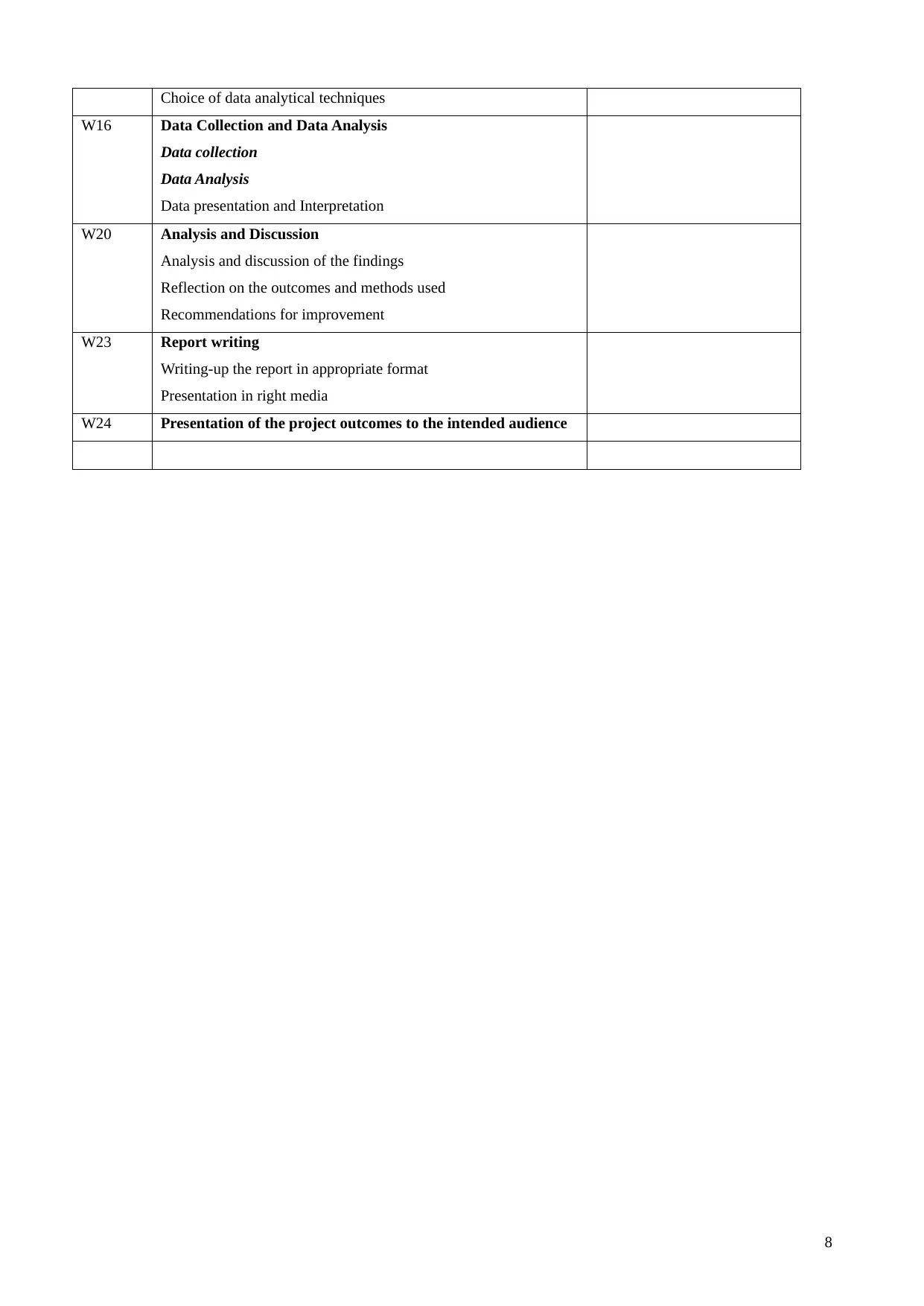
Choice of data analytical techniques
W16 Data Collection and Data Analysis
Data collection
Data Analysis
Data presentation and Interpretation
W20 Analysis and Discussion
Analysis and discussion of the findings
Reflection on the outcomes and methods used
Recommendations for improvement
W23 Report writing
Writing-up the report in appropriate format
Presentation in right media
W24 Presentation of the project outcomes to the intended audience
8
W16 Data Collection and Data Analysis
Data collection
Data Analysis
Data presentation and Interpretation
W20 Analysis and Discussion
Analysis and discussion of the findings
Reflection on the outcomes and methods used
Recommendations for improvement
W23 Report writing
Writing-up the report in appropriate format
Presentation in right media
W24 Presentation of the project outcomes to the intended audience
8
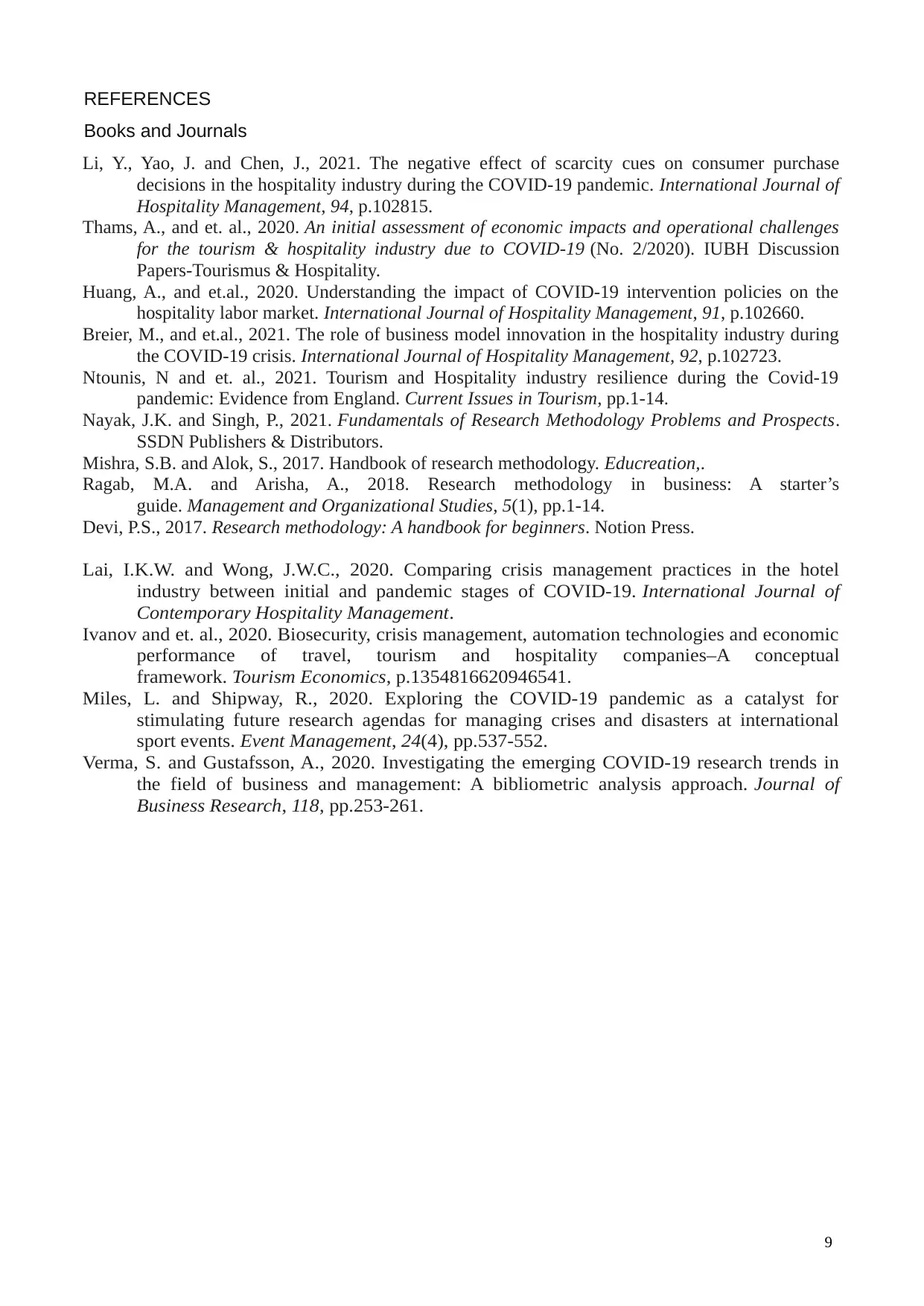
REFERENCES
Books and Journals
Li, Y., Yao, J. and Chen, J., 2021. The negative effect of scarcity cues on consumer purchase
decisions in the hospitality industry during the COVID-19 pandemic. International Journal of
Hospitality Management, 94, p.102815.
Thams, A., and et. al., 2020. An initial assessment of economic impacts and operational challenges
for the tourism & hospitality industry due to COVID-19 (No. 2/2020). IUBH Discussion
Papers-Tourismus & Hospitality.
Huang, A., and et.al., 2020. Understanding the impact of COVID-19 intervention policies on the
hospitality labor market. International Journal of Hospitality Management, 91, p.102660.
Breier, M., and et.al., 2021. The role of business model innovation in the hospitality industry during
the COVID-19 crisis. International Journal of Hospitality Management, 92, p.102723.
Ntounis, N and et. al., 2021. Tourism and Hospitality industry resilience during the Covid-19
pandemic: Evidence from England. Current Issues in Tourism, pp.1-14.
Nayak, J.K. and Singh, P., 2021. Fundamentals of Research Methodology Problems and Prospects.
SSDN Publishers & Distributors.
Mishra, S.B. and Alok, S., 2017. Handbook of research methodology. Educreation,.
Ragab, M.A. and Arisha, A., 2018. Research methodology in business: A starter’s
guide. Management and Organizational Studies, 5(1), pp.1-14.
Devi, P.S., 2017. Research methodology: A handbook for beginners. Notion Press.
Lai, I.K.W. and Wong, J.W.C., 2020. Comparing crisis management practices in the hotel
industry between initial and pandemic stages of COVID-19. International Journal of
Contemporary Hospitality Management.
Ivanov and et. al., 2020. Biosecurity, crisis management, automation technologies and economic
performance of travel, tourism and hospitality companies–A conceptual
framework. Tourism Economics, p.1354816620946541.
Miles, L. and Shipway, R., 2020. Exploring the COVID-19 pandemic as a catalyst for
stimulating future research agendas for managing crises and disasters at international
sport events. Event Management, 24(4), pp.537-552.
Verma, S. and Gustafsson, A., 2020. Investigating the emerging COVID-19 research trends in
the field of business and management: A bibliometric analysis approach. Journal of
Business Research, 118, pp.253-261.
9
Books and Journals
Li, Y., Yao, J. and Chen, J., 2021. The negative effect of scarcity cues on consumer purchase
decisions in the hospitality industry during the COVID-19 pandemic. International Journal of
Hospitality Management, 94, p.102815.
Thams, A., and et. al., 2020. An initial assessment of economic impacts and operational challenges
for the tourism & hospitality industry due to COVID-19 (No. 2/2020). IUBH Discussion
Papers-Tourismus & Hospitality.
Huang, A., and et.al., 2020. Understanding the impact of COVID-19 intervention policies on the
hospitality labor market. International Journal of Hospitality Management, 91, p.102660.
Breier, M., and et.al., 2021. The role of business model innovation in the hospitality industry during
the COVID-19 crisis. International Journal of Hospitality Management, 92, p.102723.
Ntounis, N and et. al., 2021. Tourism and Hospitality industry resilience during the Covid-19
pandemic: Evidence from England. Current Issues in Tourism, pp.1-14.
Nayak, J.K. and Singh, P., 2021. Fundamentals of Research Methodology Problems and Prospects.
SSDN Publishers & Distributors.
Mishra, S.B. and Alok, S., 2017. Handbook of research methodology. Educreation,.
Ragab, M.A. and Arisha, A., 2018. Research methodology in business: A starter’s
guide. Management and Organizational Studies, 5(1), pp.1-14.
Devi, P.S., 2017. Research methodology: A handbook for beginners. Notion Press.
Lai, I.K.W. and Wong, J.W.C., 2020. Comparing crisis management practices in the hotel
industry between initial and pandemic stages of COVID-19. International Journal of
Contemporary Hospitality Management.
Ivanov and et. al., 2020. Biosecurity, crisis management, automation technologies and economic
performance of travel, tourism and hospitality companies–A conceptual
framework. Tourism Economics, p.1354816620946541.
Miles, L. and Shipway, R., 2020. Exploring the COVID-19 pandemic as a catalyst for
stimulating future research agendas for managing crises and disasters at international
sport events. Event Management, 24(4), pp.537-552.
Verma, S. and Gustafsson, A., 2020. Investigating the emerging COVID-19 research trends in
the field of business and management: A bibliometric analysis approach. Journal of
Business Research, 118, pp.253-261.
9
⊘ This is a preview!⊘
Do you want full access?
Subscribe today to unlock all pages.

Trusted by 1+ million students worldwide
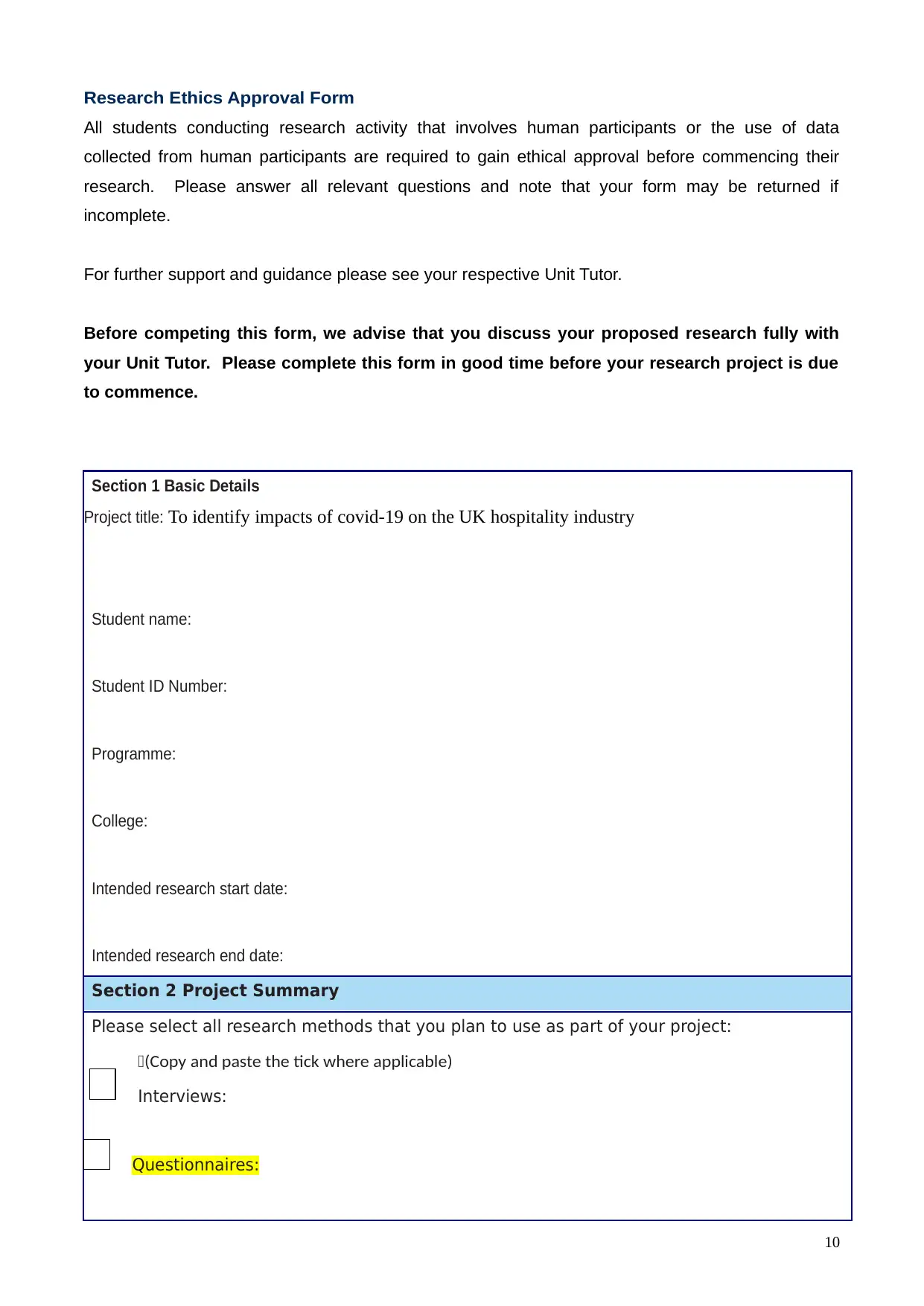
Research Ethics Approval Form
All students conducting research activity that involves human participants or the use of data
collected from human participants are required to gain ethical approval before commencing their
research. Please answer all relevant questions and note that your form may be returned if
incomplete.
For further support and guidance please see your respective Unit Tutor.
Before competing this form, we advise that you discuss your proposed research fully with
your Unit Tutor. Please complete this form in good time before your research project is due
to commence.
Section 1 Basic Details
Project title: To identify impacts of covid-19 on the UK hospitality industry
Student name:
Student ID Number:
Programme:
College:
Intended research start date:
Intended research end date:
Section 2 Project Summary
Please select all research methods that you plan to use as part of your project:
(Copy and paste the tick where applicable)
Interviews:
Questionnaires:
10
All students conducting research activity that involves human participants or the use of data
collected from human participants are required to gain ethical approval before commencing their
research. Please answer all relevant questions and note that your form may be returned if
incomplete.
For further support and guidance please see your respective Unit Tutor.
Before competing this form, we advise that you discuss your proposed research fully with
your Unit Tutor. Please complete this form in good time before your research project is due
to commence.
Section 1 Basic Details
Project title: To identify impacts of covid-19 on the UK hospitality industry
Student name:
Student ID Number:
Programme:
College:
Intended research start date:
Intended research end date:
Section 2 Project Summary
Please select all research methods that you plan to use as part of your project:
(Copy and paste the tick where applicable)
Interviews:
Questionnaires:
10
Paraphrase This Document
Need a fresh take? Get an instant paraphrase of this document with our AI Paraphraser
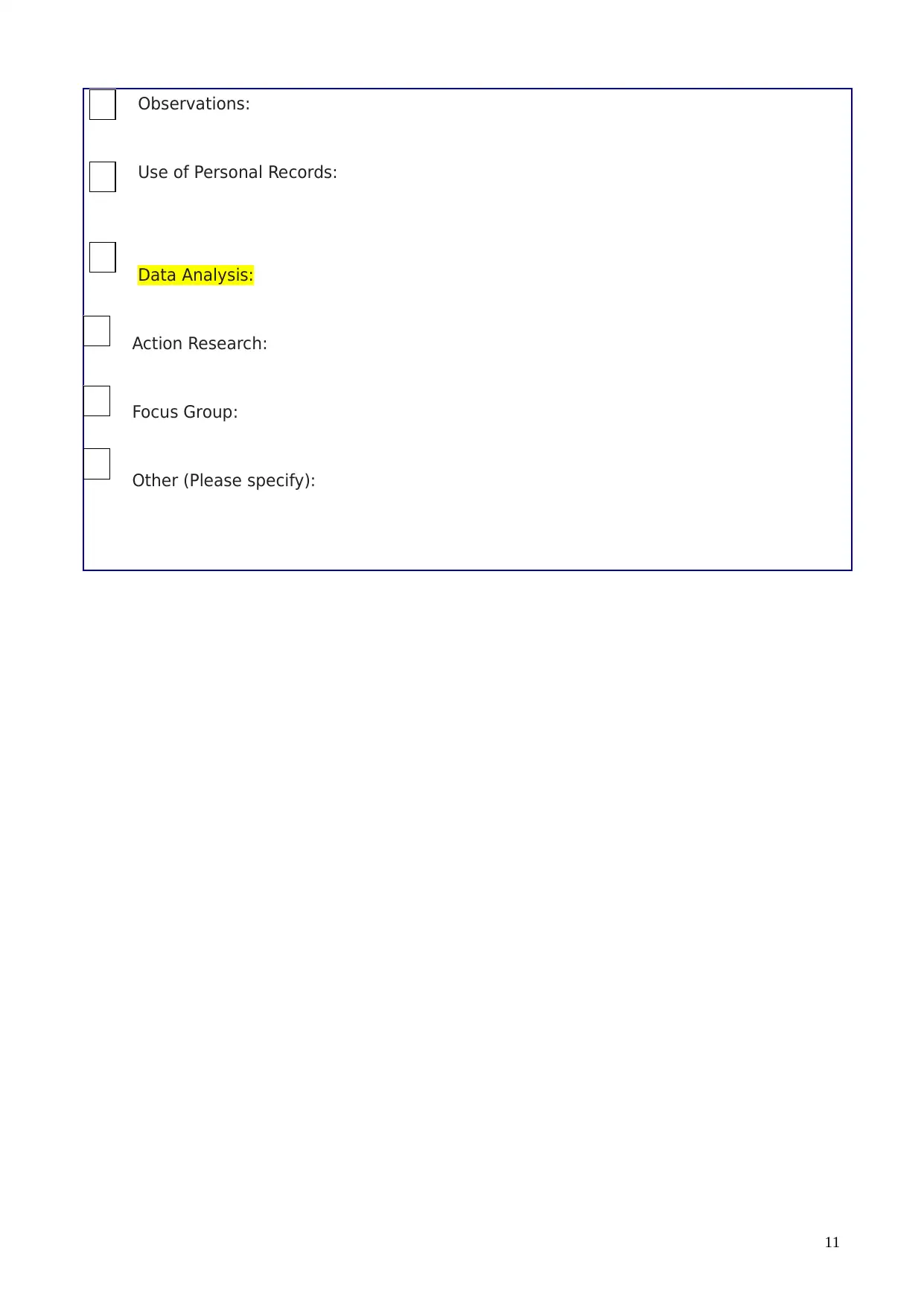
Observations:
Use of Personal Records:
Data Analysis:
Action Research:
Focus Group:
Other (Please specify):
11
Use of Personal Records:
Data Analysis:
Action Research:
Focus Group:
Other (Please specify):
11
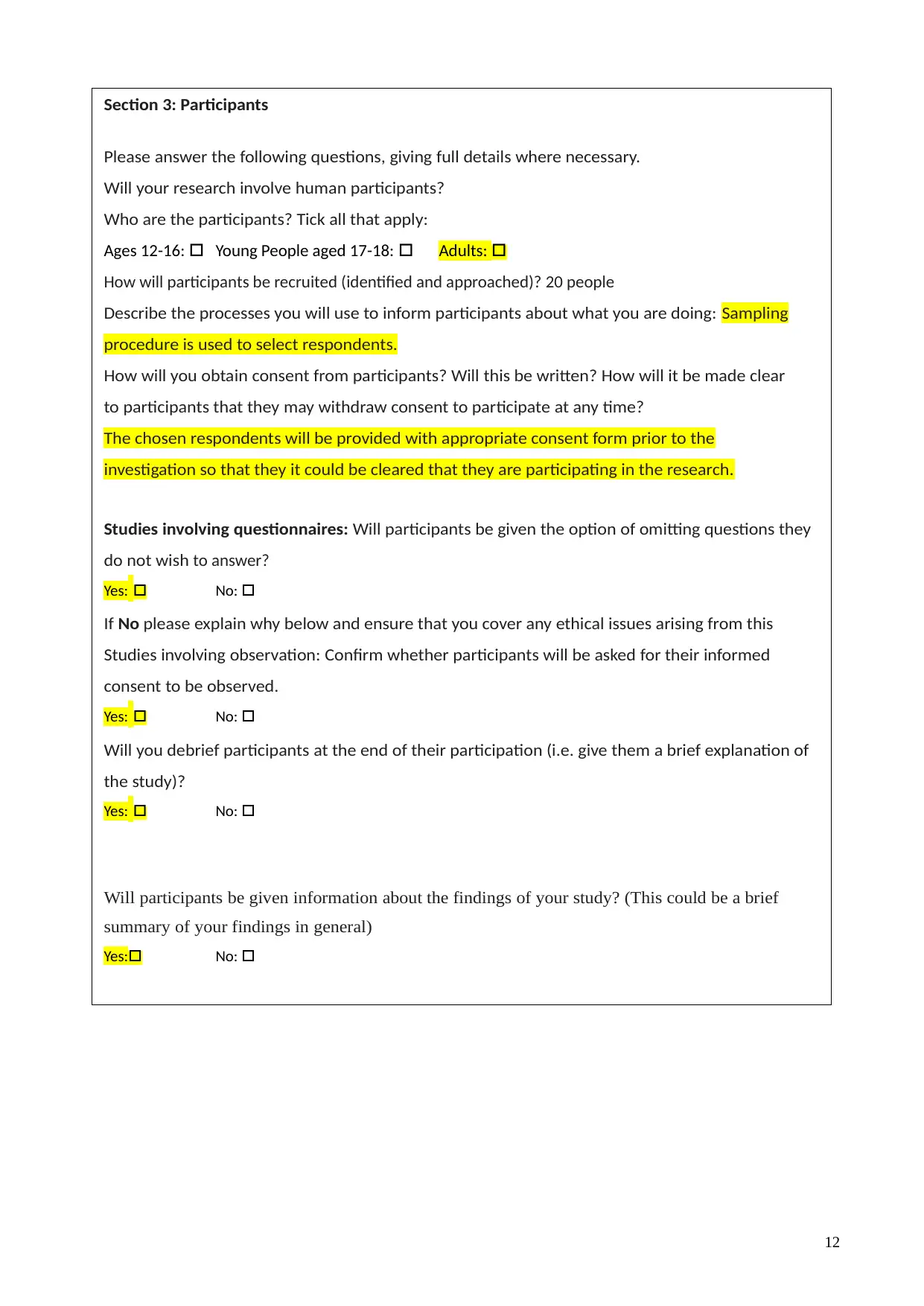
12
Section 3: Participants
Please answer the following questions, giving full details where necessary.
Will your research involve human participants?
Who are the participants? Tick all that apply:
Ages 12-16: Young People aged 17-18: Adults:
How will participants be recruited (identified and approached)? 20 people
Describe the processes you will use to inform participants about what you are doing: Sampling
procedure is used to select respondents.
How will you obtain consent from participants? Will this be written? How will it be made clear
to participants that they may withdraw consent to participate at any time?
The chosen respondents will be provided with appropriate consent form prior to the
investigation so that they it could be cleared that they are participating in the research.
Studies involving questionnaires: Will participants be given the option of omitting questions they
do not wish to answer?
Yes: No:
If No please explain why below and ensure that you cover any ethical issues arising from this
Studies involving observation: Confirm whether participants will be asked for their informed
consent to be observed.
Yes: No:
Will you debrief participants at the end of their participation (i.e. give them a brief explanation of
the study)?
Yes: No:
Will participants be given information about the findings of your study? (This could be a brief
summary of your findings in general)
Yes: No:
Section 3: Participants
Please answer the following questions, giving full details where necessary.
Will your research involve human participants?
Who are the participants? Tick all that apply:
Ages 12-16: Young People aged 17-18: Adults:
How will participants be recruited (identified and approached)? 20 people
Describe the processes you will use to inform participants about what you are doing: Sampling
procedure is used to select respondents.
How will you obtain consent from participants? Will this be written? How will it be made clear
to participants that they may withdraw consent to participate at any time?
The chosen respondents will be provided with appropriate consent form prior to the
investigation so that they it could be cleared that they are participating in the research.
Studies involving questionnaires: Will participants be given the option of omitting questions they
do not wish to answer?
Yes: No:
If No please explain why below and ensure that you cover any ethical issues arising from this
Studies involving observation: Confirm whether participants will be asked for their informed
consent to be observed.
Yes: No:
Will you debrief participants at the end of their participation (i.e. give them a brief explanation of
the study)?
Yes: No:
Will participants be given information about the findings of your study? (This could be a brief
summary of your findings in general)
Yes: No:
⊘ This is a preview!⊘
Do you want full access?
Subscribe today to unlock all pages.

Trusted by 1+ million students worldwide
1 out of 15
Related Documents
Your All-in-One AI-Powered Toolkit for Academic Success.
+13062052269
info@desklib.com
Available 24*7 on WhatsApp / Email
![[object Object]](/_next/static/media/star-bottom.7253800d.svg)
Unlock your academic potential
Copyright © 2020–2026 A2Z Services. All Rights Reserved. Developed and managed by ZUCOL.





